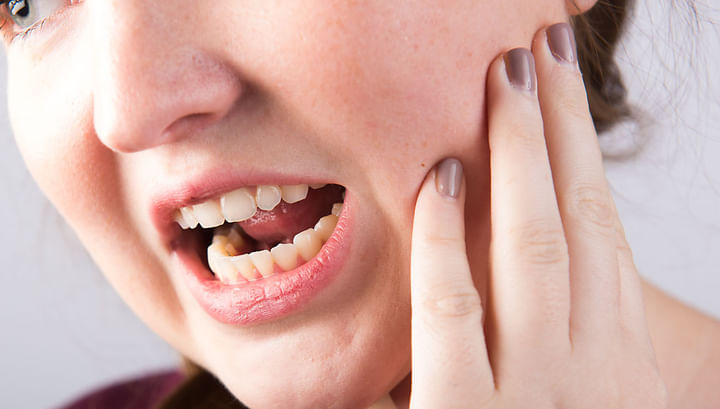Trismus Or Lock Jaw!
Trismus Or Lock Jaw
What is trismus?
Trismus, also sometimes called lockjaw, is a painful condition in which the chewing muscles of the jaw become contracted and sometimes inflamed, preventing the mouth from fully opening. For most people, fully opening the mouth means opening it beyond 35 millimetres (mm) — a little greater than the width of two fingers.
Trismus grading may be referred to as the distance between the front upper and lower teeth (incisors) when the mouth is fully open:
- Mild: >30 mm
- Moderate: 15-30 mm
- Severe: <15 mm
Causes
Trismus can occur when there’s damage or injury to the muscles of the jaw. This can happen due to:
-
Trauma
Examples of this include when bones of the jaw are fractured or when they’re immobilized to let a fracture heal.
-
Oral surgery
While trismus can arise after any oral surgery, it’s sometimes seen after the extraction of wisdom teeth, especially the lower wisdom teeth. (Wisdom teeth are the last molars on each side of the jaw.) Trismus can occur due to the inflammation the surgery creates or the hyperextension of the jaw during the procedure. It can also happen when a needle delivering the anesthetic inadvertently damages surrounding tissue.(needle injury to the nerve )
-
Temporomandibular joint disorder (TMJD)
On each side of your jaw there’s a temporomandibular joint. This joint acts as a sliding hinge, connecting your jaw to your skull and allowing you to open and shut your mouth. When there’s dysfunction in the joint, it can cause trismus and pain. Joint dysfunction can happen due to:
- trauma
- arthritis
- genetics
- stress-related behaviours like the habitual clenching and grinding of teeth.
- Radiation for head and neck cancer
Tumours that interfere with the function of the jaw itself can lead to trismus. But it more commonly occurs due to radiation of cancer involving the jaw. This can cause damage and lead to the creation of scar tissue around the joint area.
Radiation that affects the temporomandibular joint, the pterygoid muscles, or masseter muscle (all of which play a major role in chewing) is most likely to cause trismus. The risk of trismus also seems to be dose-related.
Symptoms
A mouth that will not fully open — causing opening difficulty — is the hallmark of trismus.
Other symptoms may include:
- pain in the jaw, even without movement
- difficulty or discomfort performing activities that involve opening the mouth wide (things like brushing your teeth or biting into an apple)
- inability to chew or swallow certain foods
- cramping in the jaw
- Fever (in infections)
- Stiffness, severe or dull aching pain, tenderness or swelling in the chewing muscles
- Grating, cracking, clicking or popping sounds during the movements of the lower jaw
- Decreased range of motion in the temporomandibular joint (TMJ)
- Decreased ability to chew, talk, sing, yawn
- Difficulty swallowing or choking
- Deviation of the jaw toward the affected side
- Earache, headache
- Difficulty breathing
Diagnosis
Your dentist will first perform a thorough medical exam, specifically looking for signs of oral cancer, bone and joint abnormalities, or any other abnormal tissue in your jaw that may lead to trismus. They’ll also:
- measure how wide you can open your mouth
- ask about any recent dental treatments or procedures
- ask about any possible injuries to your jaw — for example, if you were hit in the jaw during a sporting or car accident
- ask about any history of prior surgery or radiation therapy to your head and neck
- order imaging studies such as a CT scan or an MRI scan to help determine whether your trismus is stemming from a problem with your joints or tissues.
Treatment
Trismus is more commonly temporary than permanent. But the earlier you start treatment, the better the chance for a greater recovery. Some treatment options include:
- Use of a jaw-stretching device. These devices fit between the upper and lower jaw. A physical therapist will tell you which stretches to perform and how often. Studies indicate the devices may help increase the mouth opening by 5 to 10 mm.
- Medication. Your doctor may recommend or prescribe a muscle relaxant, pain reliever, or anti-inflammatory medication.
- Physical therapy that involves massaging and jaw stretching.
- A change to a predominately soft-food diet until symptoms improve.
- Together with medical intervention, there are things you can do at home to help relieve trismus and prevent it from worsening. You can try these two or three times during the day.
- Massage. Find the areas of your jaw that are painful and, moving your fingers in a circular motion, massage the area for about 30 seconds.
How to do lockjaw exercises:
Every morning, set aside time for exercising your jaws.
- Begin by pressing your chin to open the mouth a little. Lift it back again to close the mouth. Do four sets of this exercise every day for up to eight weeks.
- Place your tongue behind your anterior teeth and relax your mouth
- Place your tongue on the floor of the mouth .
- Place your tongue behind lower teeth of jaw.
- Move your jaw left to right, hold for a few seconds, and then move it right to left.(side movement of jaw)
- Move your jaw in a circular motion. Make 5 circles to the left, and 5 to the right.
- Open your mouth as wide as you comfortably can, holding this position to stretch it for a few seconds.
- Stretch your neck. Tuck your chin into your chest and hold for 30 seconds, then bring your head back and hold for another 30 seconds. Similarly, move your head to the left and then the right. Finally, move your head in a circular motion.
Avoid clenching your jaw shut or grinding your teeth together.
Stress Reduction Techniques
Stress causes so many serious ailments, including heart disease and high blood pressure.
But did you know that it is also linked to lockjaw?
Relaxation techniques such as meditation and deep breathing may help with this problem. It can help ease teeth grinding, teeth clenching, lip biting and so on.
Engage in stress reduction exercises such as yoga, meditation, and deep breathing. Set aside time for deep breathing and meditation during the day. It’s also a good idea to get a massage therapy twice a day for one to two months. And be sure to get plenty of rest too.
Yoga is helpful in maintaining posture.
Cold Compress - Many people rely on a cold compress for pain relief in various situations. A cold compress may also provide relief to those with lockjaw. It disrupts the nerve transmission in the fibres that are in charge of pain sensation. This way it may help you to get rid of TMJ jaw pain. A simple cold compress method to get rid of lockjaw - Wrap ice cubes in a towel. Apply on the jaw for 10 minutes to relieve stiffness. Do this three times a day until the condition improves.
Chamomile Tea - Herbal teas are also popular treatment suggestions for lockjaw. Soft Diet and eat Magnesium and Calcium-rich foods. Stay Hydrated.
Warm towels and warm compress /Heat Therapy - Heat therapy consists of placing a moist hot towel on the affected area for about 15 to 20 minutes every hour.



+1.svg)
